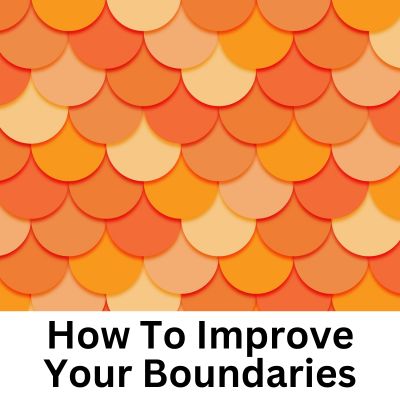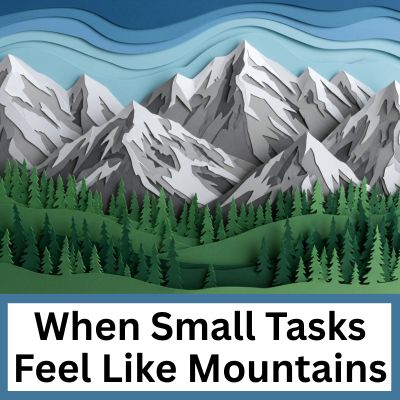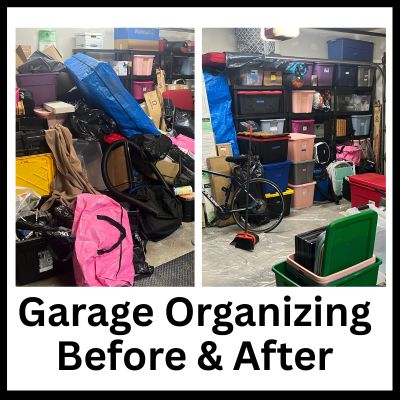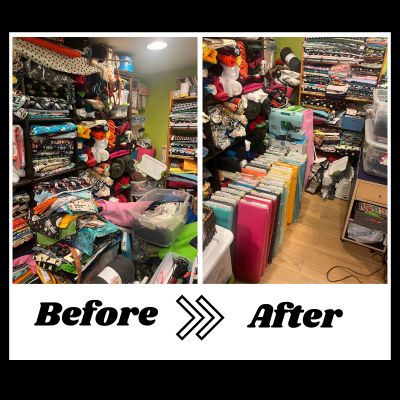How To Improve Your Boundaries

Boundaries are important because they keep us safe. They differentiate you from others, and they help us focus on what’s important in our lives! When people can’t/don’t uphold their own boundaries, sometimes they use their “stuff” to do it for them. People sometimes accumulate an over-abundance of things to keep people out of their houses and/or they will use their stuff to keep them company. Developing healthy boundaries is a big project, and although I know it can’t be solved by reading one blog post, I hope this post helps you get a little closer to your goals.
How to improve your boundaries
Below are some tips (some are easier than others) to help you improve your boundaries.
-Start with creating good quality energetic boundaries. Surround yourself in a white light bubble. Allow for this bubble to extend at least 10’ in diameter above you, behind you, below you, in front of you, and to your sides. Allow for grounding earth energy to come up through your feet and up through your body, and out through the top of your head. Allow for source energy to come down through the top of your head, and out through your hands and feet. For good healthy boundaries, stay in this bubble 100% of the time. Don’t allow anyone else’s energy to enmesh into your bubble. Think of your light like a candle light. When two candles get closer, their light gets brighter, but when they candles separate, they both still have their light.
-If you’re noticing that you’re having a hard time setting boundaries, look at who you are surrounded with. The people who appear to have the strongest amount of willpower are actually the people who put themselves in situations where they have to use the least amount of willpower. The same goes for boundaries. It’s way harder to set and uphold your boundaries when you are surrounded by other people with bad boundaries.
-Prioritize your time so that you are participating in things that fulfill your life, that help you meet your goals, and that give you energy. Sometimes bad boundaries happen when someone doesn’t have enough structure in their lives, or if they aren’t filling their time with things they love to do.
-When your boundaries are too rigid, you will keep people at a distance. When your boundaries are too loose, you will be enmeshed with other people’s problems or you may overshare about yourself. Where do you want to be on this spectrum? Sometimes just recognizing where you are on this spectrum can help you navigate closer to where you want to be.
-Mental boundaries: what is filling your thoughts? Are you consumed with what someone else is doing or not doing? Notice your attachments, and visualize a separation and letting go of whatever someone else is doing/not doing. This is not within your control.
-In energy medicine, gut health is a reflection of boundaries. Is your gut health a reflection of the health of your boundaries? If you have gut issues, it’s not automatically an indicator that you have poor boundaries. I know plenty of people who have gut issues who are great with setting boundaries. However, it may be worth considering how your boundaries may improve when your gut health improves. When your gut is healthy, it’s easier to make good decisions and regulate your mood.
-Are you struggling to set boundaries? Take classes or work with a therapist to learn more about improving your boundaries and communication skills. I have gleaned so much from this type of work over the years, and I’m always happy to share about which teachers have been the most helpful for me.
-Take time to learn what your preferences are, what you want, and practice expressing your preferences. If this is hard for you, start out with practicing non-verbal preferences such as giving yourself choices around the house, such as 3 tubes of toothpaste, and noticing which one you prefer on any given day. Work up to expressing your likes and dislikes out loud to yourself and to others about other things in your life. As you gain more confidence, you can open up about more meaningful preferences.
-Make a list of lots of different ways to say “no”, and practice saying “no” without feeling guilty.
-Do you give people gifts who have specifically requested “no gifts”? Try to understand what your motive is for ignoring their request, and find another way to get your needs met.
-Take some time to journal about what your boundaries are and why they are important to you. Practice communicating your boundaries with other people in your life. Find a balance between having boundaries that are too permeable and having boundaries that are too rigid.
-Remove yourself from situations where your boundaries are constantly trampled over. Surround yourself with people who care about you and respect your boundaries. Just as you would put a band-aid on a wound so that it can heal in a safe and clean environment, do the same for yourself. If you are recovering from an abusive situation, remove yourself completely so that you can heal and regain clear thinking.
-People who are recovering from abusive situations have a hard time being able to identify their feelings. Your body is the best indicator of how you feel in different situations. Instead of being up in your head all the time, take some time to reconnect with your body, and notice what it is feeling. Feel your feet on the ground and hold your hands just below your belly button to connect with your sacral chakra. Learn to trust yourself and your feelings, especially if you’ve been manipulated not to trust yourself.
-To be able to set and enforce good boundaries, it’s important to practice good self-care on a regular basis. Balance your yin (restful) and yang (energetic) energy. Take time to enjoy your passions, move your body, and socialize with people who fill you up, but balance that out with good quality rest such as reading, massages, cuddling a pet, and of course, getting good quality sleep!
-If you’re having a hard time with boundaries, it can be easy to be really hard on yourself. Learning how to love yourself and treat yourself with kindness and compassion is the pinnacle of this work. When you notice yourself saying things to yourself like “you suck”, “you’re never going to change”, “you’re so irresponsible”, or whatever mean things you’re saying to yourself, interrupt the thought pattern, and pick something more nurturing and helpful to say to yourself. An easy go-to thing to interrupt negative thought patterns is, “what if everything works out just fine?”
-When learning to set boundaries, I think one of the hardest things to truly accept is that you have the right to set boundaries! It can be easy to feel guilty, shameful, “too rigid”, “too harsh”, “too inflexible”, “too unforgiving”, or any number of negative things. While it might not be the most convenient thing for people who have taken advantage of your kindness, you are allowed to set boundaries (and the universe encourages it!).
-With situations of narcissistic abuse where a group of people have all banned together to outcast you (or another member of the group), it may take years to unpack the magnitude of hurt that has occurred for you or that other person. If you are the target, you can feel like it’s all your fault that another person/the group is treating you poorly. While it’s important not to fall into victimhood, it’s also important to recognize that you have been a victim, and to treat yourself with some extra compassion.
-Black tourmaline is a great stone for helping people set and uphold good boundaries. Clove, lemongrass, and tea-tree are three of my favorite essential oils for helping create good boundaries.
Good boundaries = an easily organized home
The more you practice good boundaries, the easier it will be to organize your home. You will have a better handle on your time, your energy level, and your emotional landscape. When your time, energy level, or emotions are depleted, it’s really hard to maintain the organization of your home. Good boundaries don’t come naturally to most people, so if they don’t come easy to you, remember that you’re not alone! As you embark on the adventure of setting good boundaries, make sure to take the time to notice how far you have come along the way.

By Jean Prominski, Certified Professional Organizer
Check out my media exposure: Seattle Sparkle in the Media
Download my free 5 week journal The Seattle Sparkle Method to Get Organized and Stay Organized
Sign up for my free 4 Day Color to Declutter Challenge.
Become part of a like-minded community by joining my Facebook Group, Declutter and Organize with Seattle Sparkle.
Ready to book a consultation? Complete this form.
For artwork to energize your home, order through jeanprominski.com.




